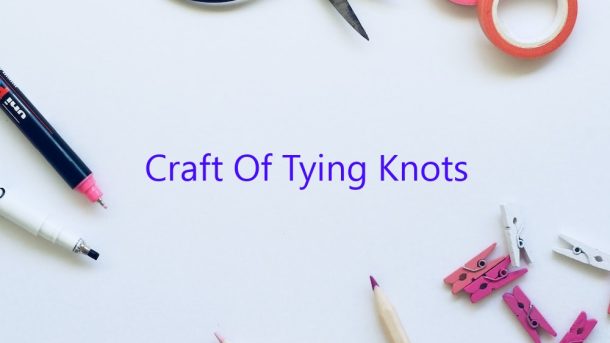There is an old saying that goes, “A woman’s work is never done.” This may be true, but it can also be said that a sailor’s work is never done either. One of the most important aspects of a sailor’s work is the craft of tying knots.
There are a variety of knots that can be used for different purposes. Some knots are used for tying lines together, while others are used for securing a line to a post or a dock. There are even knots that can be used for casting a fishing line.
The most important thing to remember when tying knots is to make sure that the knot is tied correctly. A knot that is not tied correctly can come undone, which could result in a loss of equipment or even worse, a loss of life.
There are a variety of books and websites that offer instructions on how to tie knots. It is a good idea to become familiar with as many knots as possible, so that you can be prepared for any situation.
The following is a list of some of the most common knots that sailors use:
The Square Knot
The Half Hitch
The Clove Hitch
The Rolling Hitch
The Bowline
The Sheet Bend
The Double Sheet Bend
The Fisherman’s Knot
The Surgeon’s Knot
The Square Knot
The Square Knot is one of the most basic knots. It is used to tie two lines together. The Square Knot is also known as the “Reef Knot.”
To tie a Square Knot, first make sure that the two lines are parallel to each other. Take the left line and cross it over the right line. Now take the right line and cross it over the left line. Pull the lines tight and you should have a Square Knot.
The Half Hitch
The Half Hitch is a simple knot that is used to secure a line to a post or a dock.
To tie a Half Hitch, make a loop around the post or dock and put the end of the line through the loop. Now put a Half Hitch around the line and the post or dock. Repeat this process until the line is secure.
The Clove Hitch
The Clove Hitch is another simple knot that is used to secure a line to a post or a dock.
To tie a Clove Hitch, make a loop around the post or dock and put the end of the line through the loop. Now put your hand through the loop and grab the line. Pull the line tight and you should have a Clove Hitch.
The Rolling Hitch
The Rolling Hitch is a knot that is used to attach a line to a cylindrical object.
To tie a Rolling Hitch, put the line around the object and make a loop. Now put the end of the line through the loop. Put your hand through the loop and grab the line. Pull the line tight and you should have a Rolling Hitch.
The Bowline
The Bowline is a knot that is used to form a loop in a line.
To tie a Bowline, make a loop in the line and put the end of the line through the loop. Now put your hand through the loop and grab the line. Put your thumb in the loop and pull the line tight. You should now have a Bowline.
The Sheet Bend
The Sheet Bend is a knot that is used to join two lines together that are of a different size.
To tie a Sheet Bend, put the smaller line over the bigger line. Now take the bigger line and put it over the smaller line. Put your hand through the loop and
Contents [hide]
What is the craft of tying knots called?
The craft of tying knots is called knotting. Knotting is the process of joining two ropes together. There are many different knots that can be used for different purposes. Some knots are used for tying things down, others are used for joining two ropes together, and others are used for making rope bridges.
One of the most important things to remember when knotting is to always keep the rope taut. If the rope is slack, the knot will not be as strong as it could be. It is also important to make sure the ropes are clean and dry before knotting them together.
There are many different types of knots, and each one has its own unique properties. Some knots are more secure than others, and some knots are easier to untie than others. It is important to learn as many different knots as possible, so that you can choose the right knot for the job.
Knotting is a skill that takes time and practice to master. But once you know the basics, you will be able to tie any knot you need to. So the next time you go camping, or need to tie something down, be sure to give knotting a try!
How do you tie a sisal rope knot?
A sisal rope knot is a type of knot that is commonly used to secure a line to a post or another object. To tie a sisal rope knot, you will need a length of sisal rope and a pair of scissors.
To tie the knot, start by cutting a length of rope that is about six feet long. Thread one end of the rope through the loop on the other end, and pull the rope tight.
Now, make a loop in the rope and thread the end of the rope through the loop. Pull the rope tight to create a second loop.
Thread the end of the rope through the first loop, and pull the rope tight. You have now created a sisal rope knot.
What is a 6 letter word for uproar?
A six letter word for uproar is pandemonium. pandemonium is a state of uproar or tumult.
What is the name of knot tying in Japan?
In Japan, there is a specific name for every knot. This is because the Japanese people have a long history of knot tying, and have developed many unique knots. Each knot has a specific name and purpose, and is typically used for a specific task.
Some of the most common knots include the square knot, the bowline knot, and the clove hitch. These knots are all used for different purposes, and are typically easy to learn.
The square knot is one of the most common knots, and is used to tie two pieces of rope together. It is also known as the sailors knot, and is very versatile.
The bowline knot is another common knot, and is used to create a loop in a piece of rope. It is a very strong knot, and is often used in maritime applications.
The clove hitch is another versatile knot, and is used to attach a rope to a post or another object. It is quick and easy to tie, and is very secure.
What do you call the knot tying in China?
What do you call the knot tying in China?
The Chinese term for knot tying is “jieguan” 结网. This term is used to describe the process of knotting two or more pieces of string, rope, or thread together. There are many different types of knots that can be used for various purposes, such as tying a shoelace, mending a tear, or constructing a piece of clothing.
One of the most basic knots is the square knot. This knot is used to join two pieces of string together, and it is also known as a reef knot. To tie a square knot, cross the two pieces of string in the middle, and then tie a knot on each side of the crossover. Make sure that the knots are tight, and that the two pieces of string are lined up evenly.
Another common knot is the bowline knot. This knot is used to create a loop in a piece of string, and it is easy to untie even after it has been subjected to a lot of strain. To tie a bowline knot, make a loop in the piece of string and then pass the end of the string through the loop. Tuck the end of the string under the loop, and then pull the string tight.
There are many other types of knots that can be used for various purposes, and it is important to know how to tie them correctly in order to achieve the desired results. If you are not familiar with the different types of knots, it is a good idea to practice tying them before you need to use them. With a little practice, you will be able to tie any knot with ease.
How do you tie a hog knot?
A hog knot is a type of knot that is used to join two ropes together. It is a fairly simple knot to tie, and it is very strong.
To tie a hog knot, first make a bight, or loop, in one of the ropes. Then take the other rope and pass it over the top of the first rope, and through the loop. Pull the ropes tight, and you’re done.
The hog knot is a very strong knot, and it is often used to join two ropes together. It is also very easy to tie, making it a good knot for beginners.
How do you tie a goat knot?
The goat knot is a type of knot that is used for securing ropes together. It is named for its resemblance to the horns of a goat. The goat knot is relatively easy to tie and is very secure.
To tie a goat knot, first make a loop in the rope. Then, take the end of the rope and put it through the loop. Twist the rope around itself two or three times to make a knot. Pull the knot tight.




